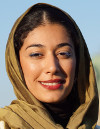21st Karlsruhe Dialogues - Speakers
Countering Extremisms: Women’s Role after the Arab Spring
Hajer Sharief
Speaker

In 2013, she founded and became a chairperson of the Libyan Women Database, a professional network for Libyan women with more than 1000 members inside and outside Libya. She is also the founder and policy advocate of 1325 Network in Libya, advocating for the UN Security Council Resolution 1325 on women, peace, and security. The network provides policy recommendations, strategic advice, and proposes courses of action to Libyan national authorities, such as the United Nations-led peace talks in Libya.
In August 2016, United Nations Security General Ban Ki-moon appointed her to serve as an advisor for the United Nations advisory group on a global study on youth, peace, and security mandated by the Security Council. Here, she advocates the role of youth in countering violent extremism and in working to de-radicalise society.
Sharief is an advocate for the Kofi Annan Foundation on Countering Violent Extremism. Most recently, she was announced the recipient of the Student Peace Prize 2017.
Statements
In your opinion, which “enemies” pose the greatest threat to pluralistic societies?
Leaders who normalise hate; words and thoughts are more harmful than bullets and bombs, because they affect the mindset of people differently – especially in pluralistic societies, where differences between people are more visible. So, when leaders criminalise characteristics of people instead of their actions, they are criminalising all members of society who share these characteristics, which will ultimately lead to the segregation of people in that society.
Public trust in elites and the media has been declining in recent years. What do you think can be done in order to restore this trust?
I think there should be a serious debate about the role of media in addressing certain issues. I am not in favour of state regulations to monitor the media, but I think there should be co-operation between states, civil society, and the media in addressing issues such as extremism and terrorism, for example.
The use of the word ‘elite’ is controversial to me; what qualifications should a person have to be considered part of an elite? Who gets to decide on these qualifications? In every group, there are people who know better than others regarding certain aspects of life. But generally, I think we should stop making a distinction between people within society, and only then people will believe in the group of people who lead them.
